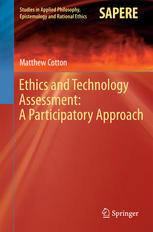

Most ebook files are in PDF format, so you can easily read them using various software such as Foxit Reader or directly on the Google Chrome browser.
Some ebook files are released by publishers in other formats such as .awz, .mobi, .epub, .fb2, etc. You may need to install specific software to read these formats on mobile/PC, such as Calibre.
Please read the tutorial at this link: https://ebookbell.com/faq
We offer FREE conversion to the popular formats you request; however, this may take some time. Therefore, right after payment, please email us, and we will try to provide the service as quickly as possible.
For some exceptional file formats or broken links (if any), please refrain from opening any disputes. Instead, email us first, and we will try to assist within a maximum of 6 hours.
EbookBell Team

0.0
0 reviewsWhether it is nuclear power, geo-engineering or genetically modified foods, the development of new technologies can be fraught with complex ethical challenges and political controversy which defy simple resolution. In the past two decades there has been a shift towards processes of Participatory Technology Assessment designed to build channels of two-way communication between technical specialists and non-expert citizens, and to incorporate multiple stakeholder perspectives in the governance of contentious technology programmes. This participatory turn has spurred a need for new tools and techniques to encourage group deliberation and capture public values, moral and choices. This book specifically examines the ethical dimensions of controversial technologies, and discusses how these can be evaluated in a philosophically robust manner when the ones doing the deliberating are not ethicists, legal or technical experts. Grounded in philosophical pragmatism and drawing upon empirical work in partnership with citizen-stakeholders, this book presents a model called “Reflective Ethical Mapping” - a new meta-ethical framework and toolbox of techniques to facilitate citizen engagement with technology ethics.